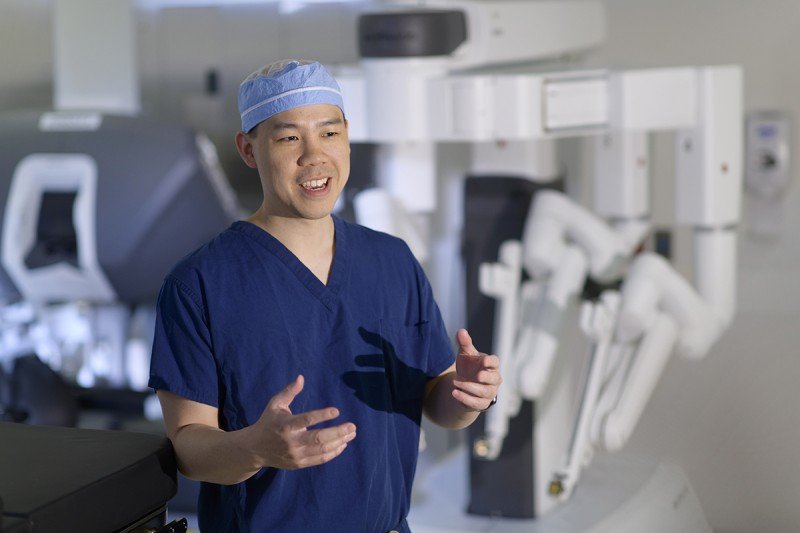
Surgeon Alvin Goh is helping MSK expand the robotic surgery options for people with bladder cancer, including advanced reconstruction procedures that create a substitute bladder.
Surgery to treat cancer has been transformed by minimally invasive techniques. These procedures use keyhole-size incisions and often result in less pain and blood loss. People who have minimally invasive surgery generally have smaller scars and, potentially, a shorter recovery time.
One advanced minimally invasive method is robotic surgery. A surgeon sits at a console and manipulates interactive arms that control the movements of instruments inside a patient. Memorial Sloan Kettering has the largest robotic surgery program in the United States.
Bladder cancer, however, presents a special challenge for robotic surgery. For advanced forms of the disease, it is often necessary to remove the bladder completely — a procedure called a cystectomy. Traditionally, people needed to have an external pouch to collect their urine. Now, surgeons have developed ways to construct a bladder substitute. This is known as a neobladder and is made using a person’s own intestine. Done in tandem, the surgery is called a robotic cystectomy with intracorporeal neobladder.
Increasingly, doctors are gaining experience with robotic cystectomy. The second part of the procedure, building the neobladder, is significantly more advanced. It requires very precise measuring, folding, and sewing of delicate tissue while avoiding blood vessels — and all done within the body itself. The procedure is so complex that very few surgeons attempt reconstruction robotically. Instead, they use a conventional open approach with a larger incision in the abdomen. As a result, few hospitals have expertise in doing the entire procedure robotically.
More Options for People with Bladder Cancer
MSK is changing this outlook with its program in minimally invasive bladder surgery. MSK has been actively involved in studying the patient benefits of robot-assisted cystectomy. Now under the leadership of surgeon Alvin Goh, MSK offers people with bladder cancer a full array of robotic surgery options, including robotic cystectomy with neobladder creation.
“At MSK, our bladder cancer surgeons are among the most highly experienced in the world using all approaches,” says Dr. Goh, who is Director of Robotic Urologic Surgery Technology and Education. “The experts performing open surgery have had outstanding results, and we want to make sure that anything we do robotically meets that standard or even exceeds it. Our goals are always to achieve the best possible outcome while maximizing preservation of function.”
Learn about robotic surgery for muscle-invasive bladder cancer.
He emphasizes that regardless of the technique used, understanding how bladder cancer develops and progresses as well as the skill of the surgeon are the most important factors in successful treatment.
“Very few programs exist that are doing this, especially in the United States,” Dr. Goh says. “At many hospitals, patients are presented with options based more on what the surgeon is comfortable doing, rather than what may actually be best for them. At MSK, we have the expertise and track record to perform the full range of operations.”
Dr. Goh helped develop and advance robotic intracorporeal reconstruction at the University of Southern California and Houston Methodist Hospital. He has brought this proficiency to MSK and is training many MSK surgeons in the method to make it available to a larger number of people.
Reducing Bladder Surgery Complications
Making a neobladder fully robotically may cut down on complications, Dr. Goh explains. Using small incisions reduces pain and the potential for infection. In addition, robotic surgery can minimize handling of the bowel.
“If you can make the surgery have the least impact on the body, we anticipate that it may speed the time to when people can resume normal activity,” Dr. Goh says. “This could have a big benefit for our patients’ quality of life.”
Edward Korn was one of the first MSK patients to receive a neobladder constructed fully through robotic techniques. In early 2016, he was diagnosed with stage II muscle-invasive bladder cancer at another Manhattan hospital. When he decided on a cystectomy, he sought treatment at MSK due to the surgeons’ expertise.
“I wanted someone who had done a million of these surgeries, so I met with [MSK urologic surgeon] Bernard Bochner and Dr. Goh,” Mr. Korn says. “They decided I was a good candidate for robotic surgery. It didn’t matter to me one way or another, but I knew robotic could be less intrusive and might limit the amount of tissue damage.”
Mr. Korn received multi-disciplinary care, including chemotherapy prior to surgery. The surgery was performed in late 2017, and he is doing well. There is no sign of cancer remaining, his prognosis is very good, and his urinary function is largely back to normal. “I’d say it’s been a home run,” he says. “A bad start to last year, but a great start to this year.”
Indiana Pouch: Another Robotic Surgery Option
If a neobladder is not possible or not recommended, other robotic techniques are available. Surgeons may create something called an Indiana pouch (also called continent cutaneous urinary diversion). In this approach, a reservoir is formed from the large bowel. This internal pouch is connected to a tiny opening created in the belly button. To drain the urine, the person regularly inserts a catheter through this opening. As with a neobladder, MSK’s doctors have extensive experience with this and other forms of urinary diversion. MSK is one of very few places that does an Indiana pouch completely robotically.
Regardless of the technique, people having surgery for bladder cancer at MSK benefit from the combined expertise of the oncologists, pathologists, and radiologists who care for them. Everyone on MSK’s care teams aims to produce the best outcomes. To speed recovery, MSK has new protocols for people having a cystectomy, whether open or robotic. These rules have helped reduce the length of time that people spend in the hospital for both approaches.
“This is a collaborative effort among all our surgeons to find the best ways for treatment,” Dr. Goh says.



